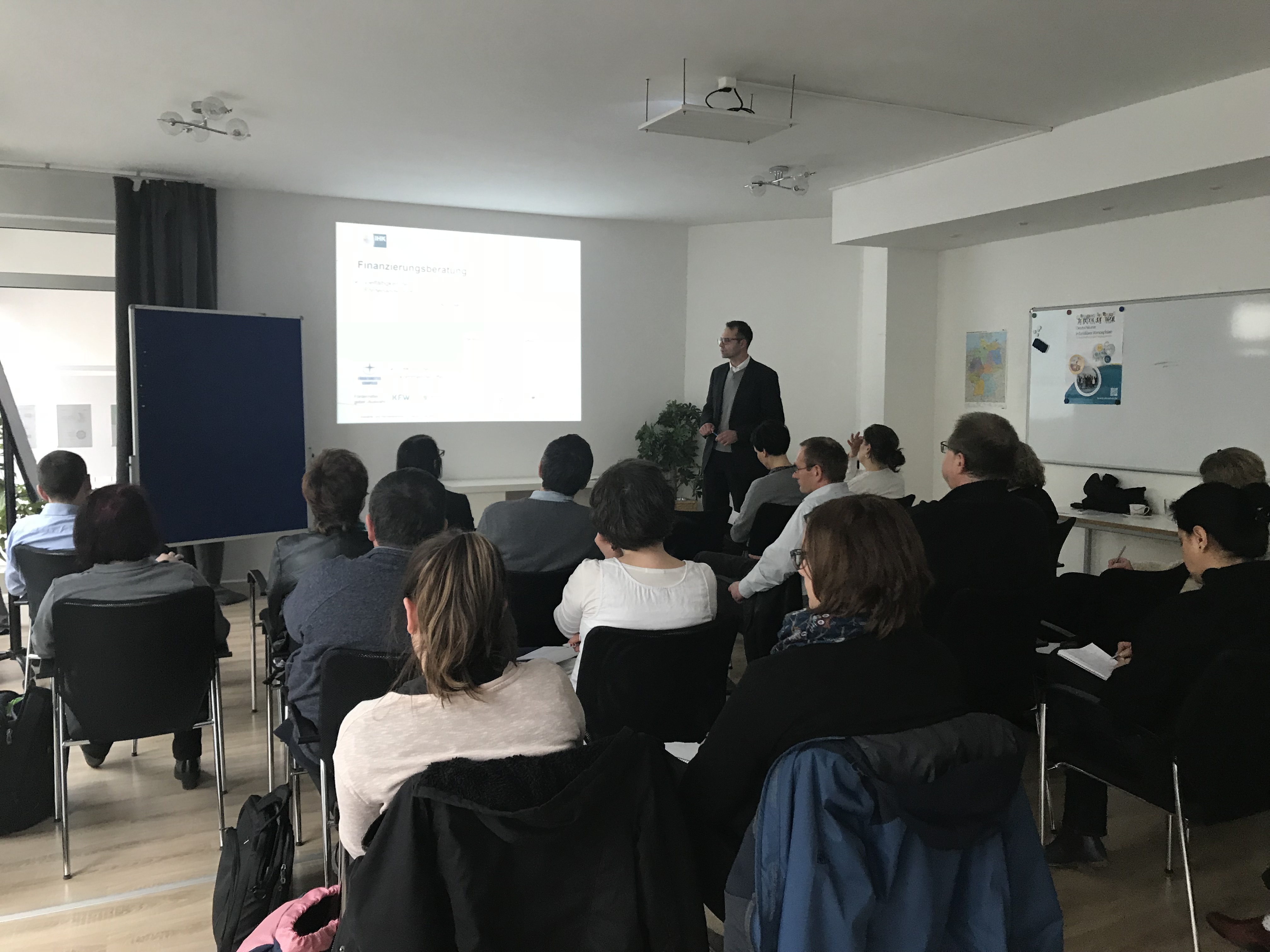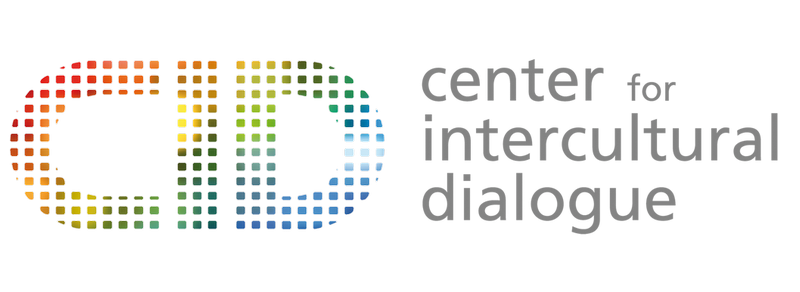Germany

What: Networking and IdeaLab: Conference to present the project output
Where: Leipzig, Germany
When: January 19th, 2018
Description: The multiplier event in Germany was held on 19.01.2018, to share the outcomes of the project Social Inclusion through Entrepreneurship, to discuss this topic of social entrepreneurship and its relevance for the region. The event combined a presentation by different actors in this field with practical workshops about starting up. After a welcome by Sabine Roehrig-Mahhou, the director of Wisamar, Dorit Richter, representative of the education department at the Municipality of Leipzig, shared her views on the importance of social entrepreneurship and informed about the different support structures and counselling offers that people interested in starting up or counselling bodies in relation to labour market integration can refer to. Sabine Roehrig-Mahhou took up the topic and presented the
project “Social Inclusion through Entrepreneurship”, introducing different social entrepreneurship models and presenting the participants the main Manual and Curricula for Social Entrepreneurship.There were further presentations by Stefan Heilmann, the responsible manager for starting-up and business support at the Chamber of Commerce and Industry Leipzig, with guidelines how to start-up and presented the support offered by the Chamber in this field, Andreas Kirste, director of the Existenzgründerzentrum Leipzig GmbH (start-up center Leipzig), who presented the Timmons model aiming at decision preparation in terms of starting-up, and Frank Lemloh from the
Social Impact Lab who gave different best practice examples of social entreprises. All speakers were open to discuss the topic with the audience in form of a panel and common discussion. What followed was also testing of the manual where the participants of the conference could put in practice the tools and methods that were outlined in the publication. A feedback round at showed that all participants highly appreciated the informative day, especially the mix of theoretical background, information about support structures and the practical exercises of start-up workshops and consultancies. The participants appreciated the non-formal and interactive approach of the workshop session. Besides they emphasized that contacts were made that enable future networking. The event was attended by
20 persons.
Belgium

What: Conference to present the project output
Where: Brussels, Belgium
When: January 21st, 2018
Description: The multiplier event in Belgium happened on 21.01.2018 in Brussels,with the target group being representatives from international organizations and institutions but also educators within non-formal education and adult education. The event gathered 21 participants which were coming from: European Commission, Youth partnership between European Union and Council of Europe, ALDE group in the European Parliament, European Youth Forum, European projects association, Youth for Exchange and Understanding, Mission of Republic of Macedonia to the European Union, Eurashe – European Association of Institutions in Higher Education, European Youth Card Association and other international organizations or institutions and consultants. The event itself acted as a space for in-depth discussion with several representatives from international organizations (Youth for Exchange and Understanding, European Youth Forum, AEGEE Students forum, Eurashe and others). On the event representatives from OTB International were presenting in depth the manual and presenting the opportunities how they can use it in their daily work. Beside this, through the discussions the organizations were brainstorming about how they can use entrepreneurship and how to promote it as a civil society organization. Following the presentation of the project was the division in working groups on the practical use of the manual in their work. The working groups were realized in an informal setting where the participants were discussing the manual and different parts.They were mostly focusing on the question “What can I do in my work with a manual like this?”. This motivated this diverse group of stakeholders to think how they can use the manual in their work and with this we encouraged them to use it and disseminate. After the discussions the participants were asked to share the talks from their groups. The main outcomes: the pool of trainers that a lot of the organizations present have in their structure can use the manual and it is a very valuable material for capacity building, the manual gives a great combination of theory but also practice with real examples of social businesses from all around Europe.
Macedonia

What: Training for Multipliers
Where: Kumanovo, Macedonia
When: February 22-24, 2018
Description: The training aimed at encouraging and educating course participants on how to utilize the SE Manual and Curriculum for promoting SE among the groups they work with. The training was done through experiential learning, the participants will have the chance to get familiar with different approaches, techniques and get their own ideas on how to deliver trainings and use the manual for SE. The learning outcomes the course was striving to achieve were met to their fullest. Based on the participants’ reflections all of them developed a basic understanding of the concept of social entrepreneurship and how it is different from the entrepreneurship that’s commonly known. They showed increased interest in disseminating the gained knowledge and help some of the people they work with in exploring the idea of social entrepreneurship and see if it suits them. Having in mind that this group was consisted of high school professors, municipality representatives and civil society representatives, it was little bit harder for them to see all the variations of support they can give to young people interested in starting this type of ventures, or even motivate young people in trying to establish their own employments by initiating social entrepreneurship, but they gained a lot by the mutual exchange of experience and knowledge. The participants gained a basic understanding on what is social entrepreneurship and why is it important, understanding on the concept of social inclusion through social entrepreneurship, knowledge on the steps for developing social entrepreneurship and basic practice in developing business ideas and creating business plans. This has proven to be particularly useful for the teachers in the high schools.

What: Conference to present the project output
Where: Skopje, Macedonia
When: February 26th, 2018
Description: The conference was held in the Center for Design and Innovations – Public Room, Skopje on the 26.02.2018. It was attended by 49 participants, and it’s agenda included a presentation of the project and publication, done by the project coordinator
Dragana Jovanovska, a plenarry with 3 key-note speakers followed by a discussion with participants, two working groups and final summary of the recommendations from the participants’ side, followed by a networking cocktail. The speakers were a representative from the Ministry of Labor and Social Politics who spoke about the benefits of the Youth Guarantee, a representatives from the Agency for
Employment in the Republic of Macedonia on the potential and interest for the social entrepreneurship on a national level and a representatives from the Association for health education and research – HERA who shared a successful practice of a social enterprise where unemployed Roma women have been trained to become caretakers for the elderly and have formed a social enterprise. The working groups were directed towards discovering the social entrepreneurship through the prism of the laws
and legislations in Macedonia, but also in the aspect of working with vulnerable groups. Main conclusions were the need for development certain taxation approach towards the social entrepreneurs and the social entrepreneurial entities, defining their statute of and recognising them as social beneficiaries and have special priorities towards other enterprises due to its social character of their
work, developing a registry of social enterprise and certain models of evaluation of social change and the impact they will have on the society, mechanisms to support the vulnerable groups after the trainings they have because theory is not enough, and most importantly – there should be mapping of the needs of the vulnerable group prior to establishing an enterprise with a social component that they
should benefit from.
